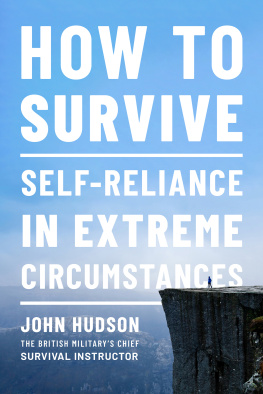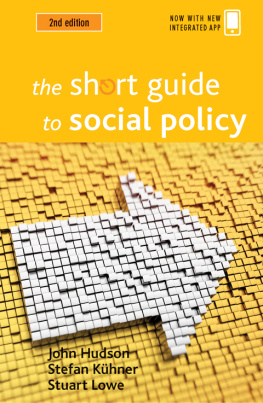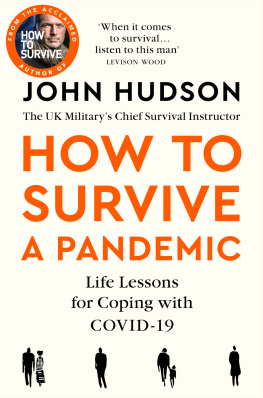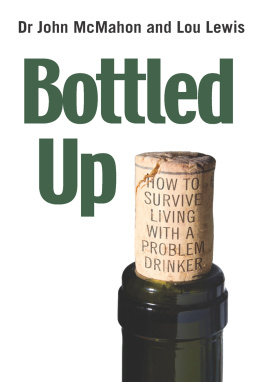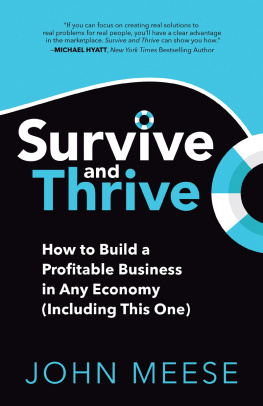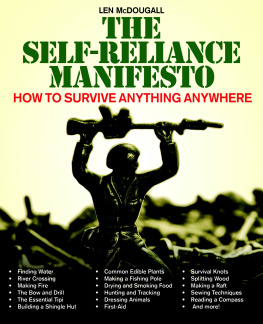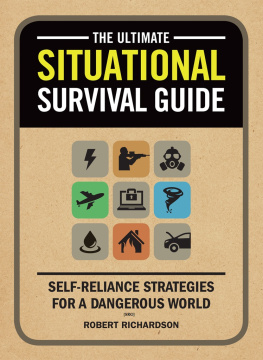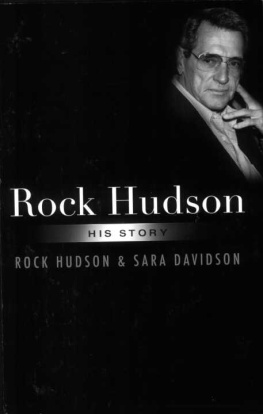John Hudson - How to Survive: Self-Reliance in Extreme Circumstances
Here you can read online John Hudson - How to Survive: Self-Reliance in Extreme Circumstances full text of the book (entire story) in english for free. Download pdf and epub, get meaning, cover and reviews about this ebook. year: 2020, publisher: Countryman Press, genre: Religion. Description of the work, (preface) as well as reviews are available. Best literature library LitArk.com created for fans of good reading and offers a wide selection of genres:
Romance novel
Science fiction
Adventure
Detective
Science
History
Home and family
Prose
Art
Politics
Computer
Non-fiction
Religion
Business
Children
Humor
Choose a favorite category and find really read worthwhile books. Enjoy immersion in the world of imagination, feel the emotions of the characters or learn something new for yourself, make an fascinating discovery.
- Book:How to Survive: Self-Reliance in Extreme Circumstances
- Author:
- Publisher:Countryman Press
- Genre:
- Year:2020
- Rating:5 / 5
- Favourites:Add to favourites
- Your mark:
- 100
- 1
- 2
- 3
- 4
- 5
How to Survive: Self-Reliance in Extreme Circumstances: summary, description and annotation
We offer to read an annotation, description, summary or preface (depends on what the author of the book "How to Survive: Self-Reliance in Extreme Circumstances" wrote himself). If you haven't found the necessary information about the book — write in the comments, we will try to find it.
How to Survive: Self-Reliance in Extreme Circumstances — read online for free the complete book (whole text) full work
Below is the text of the book, divided by pages. System saving the place of the last page read, allows you to conveniently read the book "How to Survive: Self-Reliance in Extreme Circumstances" online for free, without having to search again every time where you left off. Put a bookmark, and you can go to the page where you finished reading at any time.
Font size:
Interval:
Bookmark:

JOHN HUDSON
SELF-RELIANCE IN EXTREME CIRCUMSTANCES

Copyright 2020, 2019 by John Hudson
First published in the U.K. by Macmillan Publishers International Limited under the titles How to Survive: Lessons for Everyday Life from the Extreme World and How to Survive a Pandemic: Life Lessons for Coping with COVID-19
All rights reserved
For information about permission to reproduce selections from this book, write to Permissions, The Countryman Press, 500 Fifth Avenue, New York, NY 10110
For information about special discounts for bulk purchases, please contact W. W. Norton Special Sales at specialsales@wwnorton.com or 800-233-4830
COVER DESIGN: ALLISON CHI
COVER PHOTO: ANYABERKUT/GETTY IMAGES
AUTHOR PHOTO ROB SIXSMITH
Production manager: Devon Zahn
Library of Congress Cataloging-in-Publication Data is available
The Countryman Press
www.countrymanpress.com
A division of W. W. Norton & Company, Inc.
500 Fifth Avenue, New York, NY 10110
www.wwnorton.com
978-1-68268-645-4 (pbk)
9781682686461 (ebk.)
For Jen
If youre going through hell, keep going.
ANON
On Christmas Eve 1971, a violent thunderstorm raged high above the Peruvian Amazon. Huge black clouds flashed white with lightning over the jungle-covered slopes. Through this churning mass, a small propeller-driven plane was tossed like a scrap of paper in the surging updrafts. LANSA Flight 508, en route from Lima to Pucallpa. Inside the plane, the ninety-two terrified passengers and crew became in turn weightless, then slammed down into their seats, their belongings raining out of the overhead lockers in pitch darkness.
At 12.36 p.m., about halfway into the one-hour journey, all contact with Flight 508 was lost.
Eleven days later, a seventeen-year-old girl crawled out of the jungle. She was the only survivor. Her name was Juliane Koepcke. She would later describe how she saw one of the engines get struck by lightning and the entire plane being ripped apart in mid-air by the violence of the storm.
That Juliane survived falling for two miles without a parachute could be described as miraculous, but the fact she was then able to walk and crawl for ten days through thick jungle with concussion, deep cuts and a broken collarbone, and finally emerge to safety, is at least equally incredible. It sounds like something so extreme as to be beyond understanding, and certainly beyond what ordinary people are capable of. But Juliane isnt some kind of superwoman, born different from the rest of us. The fact that she survived was down to a sequence of events and behaviours that allowed her to achieve the seemingly impossible but, which when understood and applied correctly, are things we can all do in all of our lives. Lets look at what happened.
The aspect of the story that certainly isnt repeatable, of course, is surviving the fall. When she came to on the forest floor, apart from the broken collarbone, she had cuts, bumps, bruises and eyes swollen half-closed from the force of the impact. No one knows for certain why the fall itself wasnt fatal, but Juliane was seatbelted into a row of three seats which spun around like a sycamore seed as it fell, and she was finally slowed in the last few metres by the branches of the tall trees themselves.
But once she was down in the jungle, there were any number of wrong steps she could have taken. Can you imagine what that must have been like, coming to for the first time, after drifting in and out of consciousness, when your worst fear has come true and youve been sucked out of a plane: a seventeen-year-old, injured, scared, lying on the floor of the jungle as vultures landed in the treetops around her? She had been belted in a seat next to her mother, but there was no sign of her now. After she had managed to stand and after searching for her mother for an entire day with no success, she had to decide what to do. The first thing she had to do was overcome the very human impulse to give up before she began. What would you do first? Try and find other survivors? Look for food and water? Tend your wounds as best you could? Look for things you could use from the wreckage of the plane? Make a shelter? The normal advice in any survival situation is to stay at the site of the incident if you can. If Juliane had stayed put in the forest and waited to be rescued shed still be there today, absorbed into the jungle soil beneath her seat like the others.
Juliane, however, had something absolutely invaluable. Knowledge. She had spent two years being home-schooled in the Amazon jungle by her parents, who were both research scientists. She knew that this was an environment that she could survive in.
Critically, she also knew that the jungle canopy was too thick for rescuers to see her where she was lying, and that she had no means to signal to them. She had to move. But where? The jungle stretched in every direction, it hummed and seethed with all sorts of life, much of it, she knew, potentially dangerous. So she thought back to the advice that her father had given her about getting rescued in dense tropical forest. She sat up and listened. And thats when she heard the sound of trickling water. She remembered his tip that following water would lead you to people. So thats what she did. Hardly able to see anything without her glasses and with only one shoe, she limped and crawled along the stream, which eventually became a river, for over 200 hours. She had to put her one-shoed foot tentatively forwards each time to avoid the jungles many thorns and fangs. The only food she had was a single bag of sweets shed found after the crash. The temptation to give in must have been enormous, but she kept going, dragging herself along, one metre at a time. After a week or so one of her wounds became infested with maggots, but she kept going and was eventually able to get them out by dousing them in petrol she found in a hut used by loggers. Ultimately, it was those workers who found her, semi-conscious in their hut, and were able to take her on the ten-hour boat trip to the nearest village. In the years afterwards, Juliane became a biologist, specializing in Peruvian bats and working in a zoological library in Munich. In 2010, she published a memoir. In an interview around publication, she said, I had nightmares for a long time, for years, and of course the grief about my mothers death and that of the other people came back again and again. The thought Why was I the only survivor? haunts me. It always will.
The question of why she survived haunted Juliane, it was a kind of guilt. But later it was reported that fourteen other passengers survived the fall to the jungle floor, strewn widely over a massive area, but didnt make it out. So the question takes on another more literal quality for me: why her? What was different about her?
What she was able to do, after the initial luck that gave her the opportunity, was to prioritize, utilize specific knowledge and fundamental principles and apply them to her situation in a flexible way. She didnt freeze, she remembered one piece of crucial advice, prioritized correctly, was adaptable, and then didnt let anything stop her, task by task, inch by inch, in spite of every mental and physical hurdle put in front of her.
What she did was remarkable, but not unrepeatable.
Font size:
Interval:
Bookmark:
Similar books «How to Survive: Self-Reliance in Extreme Circumstances»
Look at similar books to How to Survive: Self-Reliance in Extreme Circumstances. We have selected literature similar in name and meaning in the hope of providing readers with more options to find new, interesting, not yet read works.
Discussion, reviews of the book How to Survive: Self-Reliance in Extreme Circumstances and just readers' own opinions. Leave your comments, write what you think about the work, its meaning or the main characters. Specify what exactly you liked and what you didn't like, and why you think so.

